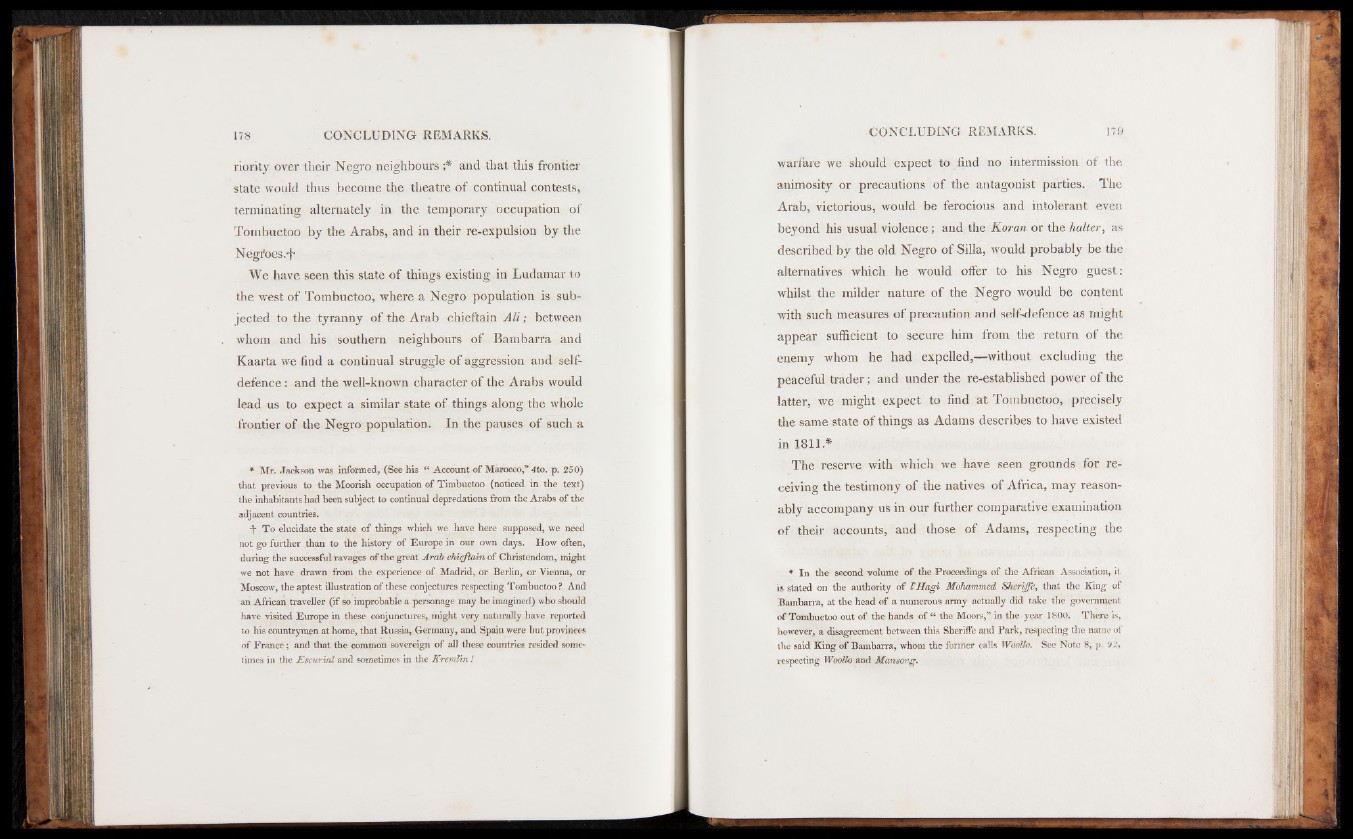
riority over their Negro neighbours ;* and that this frontier
state -would thus become the theatre of continual contests,
terminating alternately in the temporary occupation of
Tombuctoo by the Arabs, and in their re-expulsion by the
Negi’oes.-f-
We have seen this state of things existing in Ludamar to
the west of Tombuctoo, where a Negro population is subjected
to the tyranny of the Arab chieftain A li; between
whom and his southern neighbours of Bambarra and
Kaarta we find a continual struggle of aggression and self-
defence : and the well-known character of the Arabs would
lead us to expect a similar state of things along the whole
frontier of the Negro population. In the pauses of such a
* Mr. Jackson was informed, (See his <£ Account of Marocco,” 4to. p. 250)
that previous to the Moorish occupation of Timbuctoo (noticed in the text)
the inhabitants had been subject to continual depredations from the Arabs of the
adjacent countries.
+ To elucidate the state of things which we have here supposed, we need
not go further than to the history of Europe in our own days. How often,
during the successful ravages of the great Arab chieftain of Christendom, might
we not have drawn from the experience of Madrid, or Berlin, or Vienna, or
Moscow, the aptest illustration of these conjectures respecting Tombuctoo ? And
an African traveller (if so improbable a personage may be imagined) who should
have visited Europe in these conjunctures, might very naturally have reported
to his countrymen at home, that Russia, Germany, and Spain were but provinces
of France; and that the common sovereign of all these countries resided sometimes
in the Escuriai and sometimes in the Kremlin!
warfare we should expect to find no intermission of the
animosity or precautions of the antagonist parties. The
Arab, victorious, would be ferocious and intolerant even
beyond his usual violence; and the Koran or the halter, as
described by the old Negro of Silla, would probably be the
alternatives which he would offer to his Negro guest:
whilst the milder nature of the Negro would be content
with such measures of precaution and self-defence as might
appear sufficient to secure him from the return of the
enemy whom he had expelled,—without excluding the
peaceful trader; and under the re-established power of the
latter, we might expect to find at Tombuctoo, precisely
the same state of things as Adams describes to have existed
in 1811*
The reserve with which we have seen grounds for receiving
the testimony of the natives of Africa, may reasonably
accompany us in our further comparative examination
of their accounts, and those of Adams, respecting the
* In the second volume of the Proceedings of the African Association, it
is stated on the authority of VHagi Mohammed SJieriffe, that the King of
Bambarra, at the head of a numerous army actually did take the government,
of Tombuctoo out of the hands of “ the Moors,” in the year 1800. There is,
however, a disagreement between this Sheriffe and Park, respecting the name of
the said King of Bambarra, whom the former calls Woollo. See Note 8, p. 92,
respecting Woollo and Mansong.